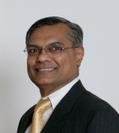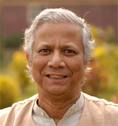Contribute
| Prof. Muhammad Yunus, Social Business And The Future Of Capitalism |
Raj Melville
07/10/2008
Earlier this year, Nobel laureate Prof. Muhammad Yunus was the invited guest speaker at MIT’s 142nd commencement. In his prepared remarks to the students he outlined how he started microcredit from a simple desire to free villagers near his university in Chittagong from the penalizing interest that they paid to moneylenders. Over the years this has grown to an organization, Grameen Bank, that has lent $7.0 Billion to 7.5 million borrowers in Bangladesh, 97 percent of them women. From this beginning his organization has expanded to provide services and products in a number of areas ranging from health insurance, to affordable cell phone service with Grameen Phone to renewable energy solutions through Grameen Shakti.
Over the years Prof. Yunus has been refining the overarching philosophy that has driven these various businesses and recently published it in his latest book “Creating a World Without Poverty – Social Business and the Future of Capitalismâ€. His remarks to the MIT audience drew on this theme.
Prof. Yunus’ core contention is that by focusing exclusively on profit maximization for shareholders, capitalism tends to simplify human beings into one-dimensional, money-driven creatures. In reality, we all are multi-dimensional beings with interests in our society, our environment as well as our financial well being. His basic proposal is that that businesses need to consider two, sometimes opposing, objectives – maximizing profits and achieving some pre-defined social objective. Different businesses will chose to focus on one or the other or some mix of both resulting in two types of businesses – traditional profit maximizing businesses and newer Social Businesses.
In his book, Prof. Yunus further elaborates on this model. While some traditional businesses have tried to include double and triple bottom line approaches that report their social and environmental impact in addition to profitability, his contention is that unless a business explicitly focuses on a primary social objective, its profit maximizing motives tend to subsume social and environmental actions. In his proposed approach, ‘Social Businesses’ would have a primary social objective, would be run just like a for-profit with a goal of generating a sustainable income stream, but, other than repaying the initial investments of its investors, would not return any additional dividends. A Social Business would not be grant based or a charity.
Prof. Yunus believes that it is better to start from scratch and build a Social Business that addresses an issue, creating new processes and approaches that help alleviate the problem. Using Grameen Bank as an example, Prof. Yunus points out how their approach is so diametrically opposite to traditional banks, since their main objective was to provide affordable credit to the poor to get them out of poverty.
• While banks lent to the affluent, Grameen lent to the poor.
• With banks the wealthy got increased attention and service, with Grameen the poorer you were, the more attention was paid to you
• Banks looked for collateral, Grameen never asked for any
• Banks required lawyers to be involved in the loan process, Grameen never used any.
By looking at the overall social issue with a fresh perspective unfettered by profit maximization, Prof. Yunus believes Social Businesses can develop new approaches and processes that can radically improve conditions around the world.
These Social Businesses would need a new set of metrics to measure their effectiveness, measures that highlight their social impact. An initial set of guidelines known as the Global Reporting Initiative (GRI) and conceived by a coalition of socially responsible investment groups and funds called CERES (Coalition for Environmentally Responsible Economies) has taken the first steps in this direction. In addition, Fast Company has also initiated a HIP (Human Impact + Profit) score card that it uses to measure the financial, social and environmental impact of companies.
Why would one invest in a Social Business when there is no apparent financial return? Today many social organizations turn to governmental or foundation sources to provide financial support. Investing those same funds in a Social Business, as opposed to giving it away as a grant, would provide a greater return. Since, by definition, a Social Business is a sustainable entity, it will pay back the initial investment thus freeing up funds to be reinvested in other social endeavors. By encouraging sustainable business models in the social sector this creates a virtuous cycle where businesses can help solve major issues while regenerating funds to be reused for other social purposes.
Prof. Yunus’ end vision is a parallel financial environment where there are hundreds of Social Businesses, where social investors can chose between investment alternatives in a dynamic ‘Social stock market’ and make informed decisions to channel their funds to support organizations that are making the most social impact.
In his closing remarks to the fresh graduates from MIT, Prof. Yunus exhorted them to make a break with the past and change the world with their ideas.
For more information on some of the organizations in this article:
• Grameen Bank: http://www.grameen-info.org/
• Grameen Phone: http://www.grameenphone.com/index.php?id=79
• Grameen Shakti: http://www.gshakti.org/
• CERES & GRI: http://www.ceres.org/NETCOMMUNITY/Page.aspx?pid=435
• Global Reporting Initiative GRI: http://www.globalreporting.org/Home
• Prof. Yunus personal Website: http://muhammadyunus.org/component/option,com_frontpage/Itemid,1/lang,en/
Prof. Yunus’ MIT Commencement Speech:
• Text of Speech: http://web.mit.edu/newsoffice/2008/yunus-0606.html
• Video: http://web.mit.edu/webcast/comm2008/comm2008-speeches-450k.asx
You can contact me with ideas, suggestions or for more information at:
SELokvani@gmail.com
You can continue this dialog on my blog at: http://socialecosystem.wordpress.com/
You may also access this article through our web-site http://www.lokvani.com/


Muhammad Yunus